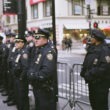Strange Coincidences—They’re beginning to pile up in the Abramoff case. It started in November 2002, when the acting U.S. Attorney on Guam, Frederick Black, was replaced the day after he subpoenaed a secret contract between Guam’s government and the indicted lobbying kingpin Jack Abramoff. Fast-forward to January 2006. As the White House is feeling the heat for its ties to Abramoff, the Bush administration suddenly names the chief prosecutor in the Abramoff investigation, Noel Hillman, to a federal judgeship in New Jersey, and he departs. Justice Department sources contend that the appointment has been in the pipeline for nearly a year, but the selection is one reason Senate Democrats are calling for an outside counsel to oversee the Abramoff probe. The timing of Hillman’s departure “jaundices the whole process,” Senator Chuck Schumer said.
Replacing Hillman as acting head of the Public Integrity Section at the Department of Justice will be Andrew Lourie, a career prosecutor from West Palm Beach with no previous involvement with the Abramoff case. Both Hillman and Lourie were protégés of Michael Chertoff, who ran the criminal division at Justice before becoming head of Homeland Security. Lourie headed Justice’s Public Integrity Section between 2001 and 2002. That job opened up for him following the sudden demotion of Section chief Lee Radek, just after House Republicans had met with Attorney General John Ashcroft, a meeting in which they complained to Ashcroft about Clinton-era decisions in the department. Another coincidence?
Katrina Forgotten—If anything defined the last year in politics, it was the images of New Orleans, flooded and drowning. Republicans and Democrats alike reacted with shock and dismay at the Bush administration’s incompetent management of the federal response. Bush eventually did the unexpected and took responsibility for his administration’s failures. In the weeks after the disaster, Bush repeatedly made trips to the area, and in New Orleans’ Jackson Square vowed to “do what it takes” to rebuild the Gulf Coast.
But today New Orleans remains a city of refugee camps, deserted and struggling to receive the $67 billion in emergency funds allocated by Congress. For its part, the Bush administration has declined to cooperate with two congressional committees investigating the storm response. Citing confidentiality concerns, the White House refused requests to turn over Katrina-related documents or e-mails and says it will not make senior officials available for sworn testimony.
One day after President Bush relegated the Gulf Coast recovery effort to a few meager lines in his State of the Union address, he proposed an additional $18 billion in post-Katrina relief aid but offered scant details about how the money would be spent. Louisiana officials, led by GOP Congressman Richard Baker, want the federal government to buy out homeowners and revitalize flooded areas. The administration opposes the Baker bill, saying it would “destroy free-market mechanisms” and instead favors using $6.2 billion in community block grants, already approved by Congress, to rebuild damaged homes. Local leaders contend that they would need three times this amount.
More of the Same—“Reform, reform, reform” became the drumbeat of the Republicans vying to replace Tom DeLay as House Majority Leader. If they repeated the word enough, the thinking went, the public would forget about Jack Abramoff, “Duke” Cunningham and all the other principals in the scandals plaguing the GOP. Ultimately, the Republicans elected Ohio Representative John Boehner, but as David Sirota wrote in our last issue, don’t expect anything to change.
Soon after Republicans took over the House in 1994, Boehner became infamous for handing out checks from tobacco lobbyists to members on the House floor after they’d voted to protect tobacco subsidies. From 1995 until 1998, he served as a liaison to corporate lobbyists under then-Speaker Newt Gingrich. Twenty-four of Boehner’s aides eventually took lobbying jobs, forming what the Washington weekly The Hill dubbed a “K Street cabinet.” As chairman of the Education and Workforce Committee, Boehner took $65,170 from the student loan provider Sallie Mae as his committee was writing new laws on student loans.
As House Republicans ended a press conference announcing their new leader, a reporter asked Boehner, “How will you tackle lobbying reform with your ties to K Street?” But Boehner and his colleagues had already turned their backs and walked away, all smiles.


